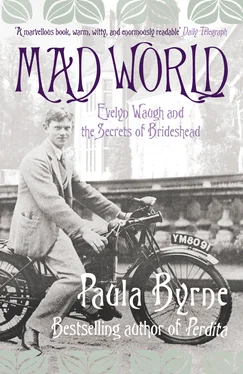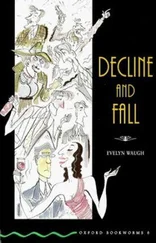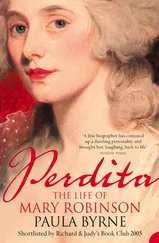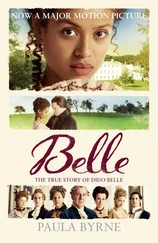PAULA BYRNE
Mad World
Evelyn Waugh and the
Secrets of Brideshead
Harper Press
An imprint of HarperCollins Publishers Ltd. 1 London Bridge Street London SE1 9GF
www.harpercollins.co.uk
This Harper Press paperback edition published 2010
First published in Great Britain by Harper Press in 2009
Copyright © Paula Byrne 2009
PS Section copyright © Sarah O’Reilly 2010, except ‘Other Worlds’ by Paula Byrne © Paula Byrne 2010
PS™ is a trademark of HarperCollins Publishers Ltd.
Paula Byrne asserts the moral right to be identified as the author of this work
A catalogue record for this book is available from the British Library
All rights reserved under International and Pan-American Copyright Conventions. By payment of the required fees, you have been granted the nonexclusive, nontransferable right to access and read the text of this ebook on screen. No part of this text may be reproduced, transmitted, downloaded, decompiled, reverse engineered, or stored in or introduced into any information storage and retrieval system, in any form or by any means, whether electronic or mechanical, now known or hereinafter invented, without the express written permission of HarperCollins ebooks
HarperCollins Publishers has made every reasonable effort to ensure that any picture content and written content in this ebook has been included or removed in accordance with the contractual and technological constraints in operation at the time of publication
Source ISBN: 9780007243778
Ebook Edition © NOVEMBER 2012 ISBN 9780007455478
Version: 2016-09-22
Cover
Title Page
Copyright
Prologue
Chapter 1: A Tale of Two Childhoods
Chapter 2: Lancing versus Eton
Chapter 3: Oxford: ‘… her secret none can utter’
Chapter 4: The Scarlet Woman
Chapter 5: In the Balance
Chapter 6: The Lygon Heritage
Chapter 7: Untoward Incidents
Chapter 8: Bright Young Things
Chapter 9: The Busting of Boom
Chapter 10: Madresfield Visited
Chapter 11: The Beauchamp Belles
Chapter 12: Christmas at Mad
Chapter 13: An Encounter in Rome
Chapter 14: Up the Amazon
Chapter 15: A Gothic Man
Chapter 16: Fiasco in the Arctic
Chapter 17: Ladies and Lapdogs
Chapter 18: A Year of Departures
Chapter 19: Three Weddings and a Funeral
Chapter 20: Waugh’s War
Chapter 21: The Door to Brideshead
Chapter 22: Brideshead Unlocked
Keep Reading
P.S. Ideas, interviews & features …
About the Author
The Waugh Generation: Sarah O’Reilly talks to Paula Byrne
A Writing Life
Life at a Glance
About the Book
Other Worlds by Paula Byrne
Read On
Have You Read?
If You Loved This, You Might Like …
Find Out More
Coda: ‘Laughter and the Love of Friends’
Sources
Index
About the Author
Praise
Also by the Author
About the Publisher
Early 1944 and Captain Evelyn Arthur St John Waugh has fallen out of love with the army. He has turned forty and is considering his options. To become a screenwriter? An overture to Alexander Korda comes to nothing. To join MI5, the intelligence service? He is turned down without an interview. Only one possibility remains: to revert to his pre-war occupation.
On 24 January he writes a letter to Colonel Ferguson, Officer Commanding, Household Cavalry Training Regiment. Copies are sent to the Secretary of State for War and to Brendan Bracken, Winston Churchill’s Minister of Information and string-puller in chief on behalf of Captain Waugh. ‘I have the honour to request,’ the letter begins, ‘that, for the understated reasons I may be granted leave of absence from duty without pay for three months.’ The understated reasons are various. That his previous service in the Royal Marines, the Commandos, the Special Services and the Special Air Service Regiment does not qualify him for his current position in a mechanised unit of the cavalry. That he no longer has the necessary physical agility for active service. That he is no good at admin, so can’t do a desk job. And that he doesn’t have the foreign languages to make him useful for the purposes of intelligence work.
Assurances are given: the novel to which he will devote his leave ‘will have no direct dealing with the war’. But expectations are dampened: ‘it is not pretended that it will have any immediate propaganda value’. The necessity of immediate action is stressed: ‘It is a peculiarity of the literary profession that, once an idea becomes fully formed in the author’s mind, it cannot be left unexploited without deterioration. If, in fact, the book is not written now it will never be written.’
Colonel Ferguson responds by ordering Waugh to go and train the Home Guard at Windsor. A less determined man than Evelyn might have capitulated and the book would never have been written. But he perseveres. By the end of January he has been granted his three months’ leave, qualified only by a commitment to a little light part-time work for the Ministry of Information. He leaves his comfortable billet in the Hyde Park Hotel and his military uniform with it.
On the morning of Tuesday 1 February 1944 he is settled in another hotel, deep in the West Country: Easton Court, Chagford, Devon – a thatched fourteenth-century farmhouse with low, dark rooms and small windows. He has been there before, in the late autumn of one of the momentous years of his life, 1931. It is a place that in his memory he cannot separate from a house and a family with which he had fallen in love that year.
In London he had regularly lain in till mid-morning. At Chagford he is up at 8.30 and at work by 10. By dinnertime on that first Tuesday, though his mind is ‘stiff’ from the tedium of army life, he has written and rewritten 1,300 words. He reports to his wife that he has made a good beginning on what he calls his ‘magnum opus’. He has ‘bought a very expensive concoction of calcium and halibut liver oil which the chemist thought would restore me to strength but on reading the label more closely I find it to be a cure for chilblains’. This may prove handy, since the lounge he has been given as a private room in which to write has a fire that smokes so badly that he has to choose between streaming eyes and frozen extremities.
By ‘close of play’ on Wednesday the score is ‘3,000 words odd’. Through the ensuing weeks he works steadily at the rate of up to 2,000 words a day, occasionally more. He revises arduously as he goes. In the end it takes him closer to five months than three, but the book that he knows in his heart he has to write is completed. The idea that had ‘become fully formed’ in his mind is ‘exploited without deterioration’.
What was that idea? The book’s original working title was ‘The Household of the Faith’. The story of a household, a family. A journey shaped by religious faith. These are its key themes. But the working title does not find its way into print. When the book is published the following year, its title page reads Brideshead Revisited: The Sacred and Profane Memories of Captain Charles Ryder: A Novel .
On the reverse side of that title page there is a notice to the effect that the volume has been ‘produced in complete conformity with the authorised economy standards’ of wartime publishing. You can tell that this is true when you hold a first edition in your hands and turn the coarse, rough-hewn pages.
Above the routine announcement concerning production standards, there is something more intriguing. A mysterious Author’s Note is signed ‘E. W.’, Evelyn Waugh. It reads: ‘I am not I: thou art not he or she: they are not they.’
Читать дальше












